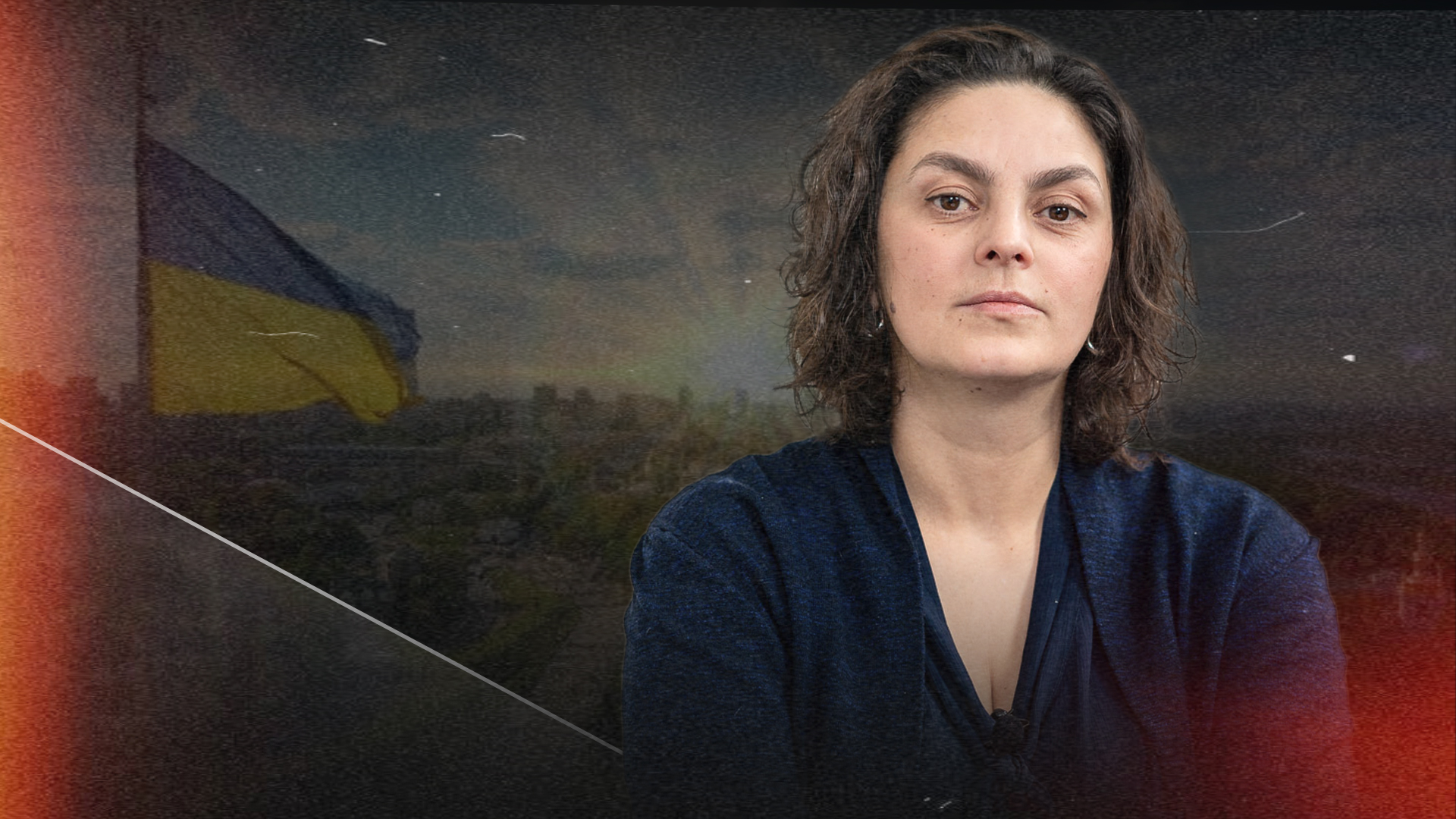
[For daily insights from throughout Ukraine, follow Ukrainian Freedom News on Telegram]
You must have carolled enough this year, haven’t you?
Well, is «enough» the word? I mostly work on the Christmas holidays, like all singers or directors. Regarding the advantages, it’s the time when you create Christmas for a large number of people. This year, I made a big event, even in terms of scale, with the participation of 50 singers. Its name is «Circle of Paradise», and the premiere took place in the Garrison Church on January 13 [St. Basil Day in Ukraine].
It brought together both amateurs and professionals, volunteers, and children of refugees from the east of Ukraine who ended up in Lviv. It was a very long process. Since September, there have been such session meetings, when people came from different cities for several days. We recorded four tracks in the Dominican temple, and the premiere of one of them has already been released. It seemed to me that this was such a laboratory project, a research. I took the most archaic examples of carols and Christmas chants that generally exist in our singing tradition.
Read also: «Muscovites won’t take away our holidays». This is how Lviv is rethinking traditional Christmas
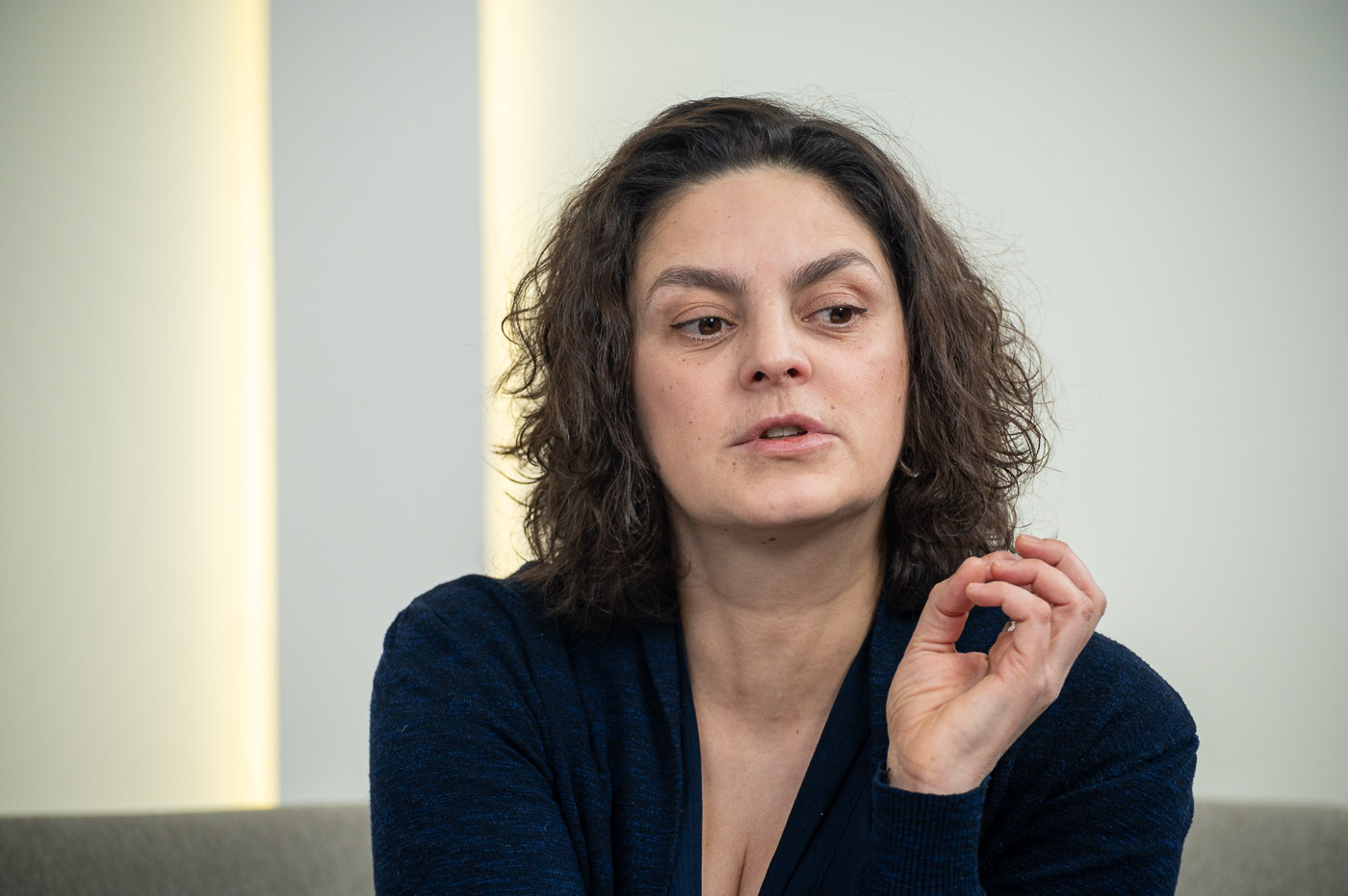
How old are they? A century?
Some of them are over a thousand years old! It seemed to me that it would be a very local product, one for the participants to sharpen their skills as singers. And also as a session of joint psychotherapy in the current wartime. But it «shot» much further. In TikTok, only one fragment of the concert now has 240,000 views. I did not expect this at all.
Being in your event in the Garrison Church, I actually felt some vibrations that the songs are very old, ancient, as if they breathe archaic. But I would like to shift the focus of our conversation a little: how can folklore be combined now and is it still relevant?
It becomes super relevant. We can see how our «Stefania« thundered to the whole world, or «Shum«. Although in a pop format, it was Ukrainian melos [the unique sound] that were included in various forms of music. With this, we will be interesting to the world and to ourselves, if we do not imitate the global European product, but create our own context, resting on and understanding the world’s musical context. But for that you need to dig your own well. «Circle of Paradise» was intended to dig even deeper. Oleh Stefan, a well-known actor of the Les Kurbas Theater, gave me a very good review in «private» and finally allowed me to quote it. Now, he works in the Kyiv theater. He said: «There’s a feeling that the European layering of baroque music and musicians that came to our culture, some layering, and influences of eras have passed… What the «Circle of Paradise» touched is the very root.»
Read also: With God’s help. How Ukraine’s first military church in Lviv serves the Ukrainian army
These melos and texts are more than a thousand years old, they work at the level of our DNA. If you listen to them, you may not fully understand the stories, but these mantras work with you. After all, it may sound strange, pathetic. Someone will think: «God, there’s so much metaphysics.» But we are looking for some spiritual practices in the world: we go to India, do yoga, and so on. I always say: it is necessary, but «learn from someone else’s, and do not shy away from your own.» If you sing the ritual vesnyanky [spring folk somgs] correctly, with the right sound, and there is a certain system of how to sing it, I teach it at master classes. This, after all, was what our grandmothers and great-grandmothers knew, and in this case, it heals. It is also part of our culture, on the basis of which you can create new content unknown to the world. Now Ukraine is «on the wave», at its peak. It seems to me that we have already declared, taken this layer – to sing the national anthem, «Cervona Ruta» (Red viburnum), «Stefania» and all the rest in the European squares. Next, it is necessary to offer the world more serious, deeper cultural projects. My team and I plan to take our opera-myth of our authorship on a European tour.
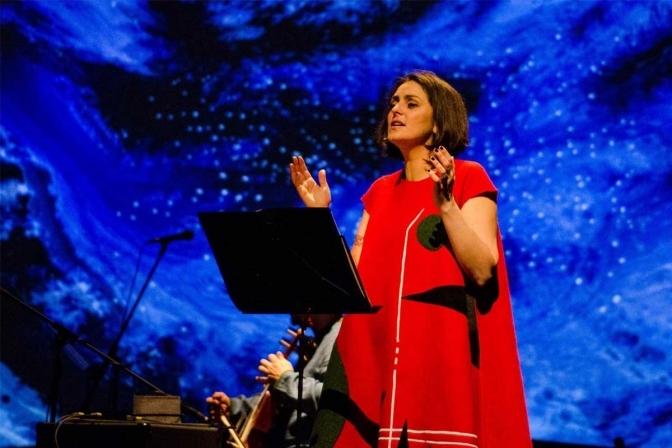
There is, for example, modern Italian music, French music of the XX-XXI centuries. There is, however, very little of their specific rock music, almost none. Obviously, there are theories that it’s a very Anglo-Saxon thing, cross-fertilized with African blues. But this surely means that there are some styles that are more characteristic of a certain ethnicity’s melos.
Yes. In general, I say that every nation sublimates its energy and mentality into a certain kind of art. If it’s Spanish, it’s flamenco dance, if it’s Romanians, it’s instrumental music, and if it’s Ukrainians, it’s singing.
Can Ukraine be a rock and roll country, for example?
Maybe. Our folk songs are really often rock or rock and roll. After all, even the track that we in «Circle of Paradise» did. I have the following compositional principle: I take folk songs, for example, shchedrivky [the carols sung on the eve of January 13, the Saint Basil Day in Ukraine], and combine four or five tracks into one, without changing each one individually, completely preserving their structure. With a certain layering, for example, as in «Popod liskom» (Under the Woods) – it’s just Africa, it sounds like the ancient source of humanity. I laugh that this is Africa, but this music becomes clear to anyone in the world, it is something that relates to a human being in general, the world structure and how a person exists in the world in relation to the sky, the earth, where the rhythm is objective, where there is an interaction of singers. If you dig deeper, all cultures have this common root, in particular, Indo-European. Once upon a time, there was only one language and one music. Ukraine is a unique carrier of these samples, not so many of them have survived in Europe.
And why, by the way?
Globalization, the slogan of the Enlightenment, especially in the 18th and 19th centuries. It was believed that folk is something very simple, many peoples did not pay attention to it, and went to composer music. After all, in our churches, too, ancient spiritual halfs were displaced, and baroque music with composer’s thinking entered. But since we were on the periphery of European processes, it played well in the case of our singing tradition. Somewhere in the villages, it was deeply conserved, even despite Stalin’s repressions. The singing is so powerful and characteristic of Ukrainians that even the Soviet «asphalt paver» could not overcome it.
How different is Ukraine when it comes to folklore? Are there any different tempos, rhythms, or does folklore in some ancient pieces converge to the same sources, if we talk about different regions?
I can say about what unites.

Even in the Garrison Church, there was something from the Hutsul region, something from eastern Ukraine.
Yes, and one of the goals of this project was to preserve the peculiarities of the sound production of each region, to make such a concert where even these boundaries would be erased, where we appeal to our archetypes, meanings that unite all Ukrainian music. Well, «A warrior on a horse – Ivanko, who waves a sword, saddles a horse, rides into a clear field» – this is a man’s victory, it is sung in all carols, in all regions of Ukraine. Or «The hostess is like the sun, the boss is like the moon» – too. That is, the archetypal elements that unite must be highlighted. There is no such law, but as an artist I am interested in how, relying on the musical features of all regions, to make concerts that people from eastern Ukraine and people from Zakarpattya will go to. But they will understand, they will see that it is all sewn together with meanings, the vibration of this land, one mentality. I hope that in the «Circle of Paradise» it succeeded.
I once read an interview with a Japanese researcher of Slavic folklore, who was initially very fond of Russia, obviously read Dostoevsky, and something else. He came to Russia to study its deep folklore, and after some time, moved to Ukraine. Explaining why this happened, he says: «It turned out that the oldest there is the 18th-19th centuries.»
There are even older ones here – carols, wedding songs, shchedrivky.
But there is no more Russian folklore there.
Yes.
Something that can be identified as Russian – some «birch», Russian language. And then, something specific begins in other languages, some kind of music...
...of the indigenous peoples.
Definitely. He came here, and here he discovered a kind of longing. This is a powerful story. For example, things like the folk song «Kopav, kopav krynychenku« (Dug, dug a well) – is it folklore?
Of course, it’s folklore. But it doesn’t seem that old. There are different layers of folklore. It seems to me that now, in general, there is very little Ukrainian content that is based on tradition. I believe that all these layers should be tightly packed with their content. Somewhere you have to dig deeper, and somewhere you need to make a super elitist product. In the fall of 2021, the premiere of the myth opera took place in our opera house. I am the author of this project, I wrote the libretto and created the voice parts together with the composer Maria Oliynyk. There is a very good choir, everything was great. Instead of the traditional Italian bel canto, I based it on Ukrainian folk songs with their specific sound production, with melos. Such an opera must now be introduced to Europe. It is called «Ukraine – Terra Incognita» in five myths, because we are really terra incognita for them, they don’t know anything about us. In the end, this was evidenced by recent events, by the war. They said that we would surrender in three days. I think they were very surprised, and we were even more surprised, because we don’t even fully understand our efforts, as well as the values and strength of our culture. To a large extent, a lot is embedded in our song, through the song we show ourselves the brightest. Of course, there is also dance, instrumental music, but a song is like our philosophy, our worldview, our epic, a bundle of energy, and we have to draw from it.
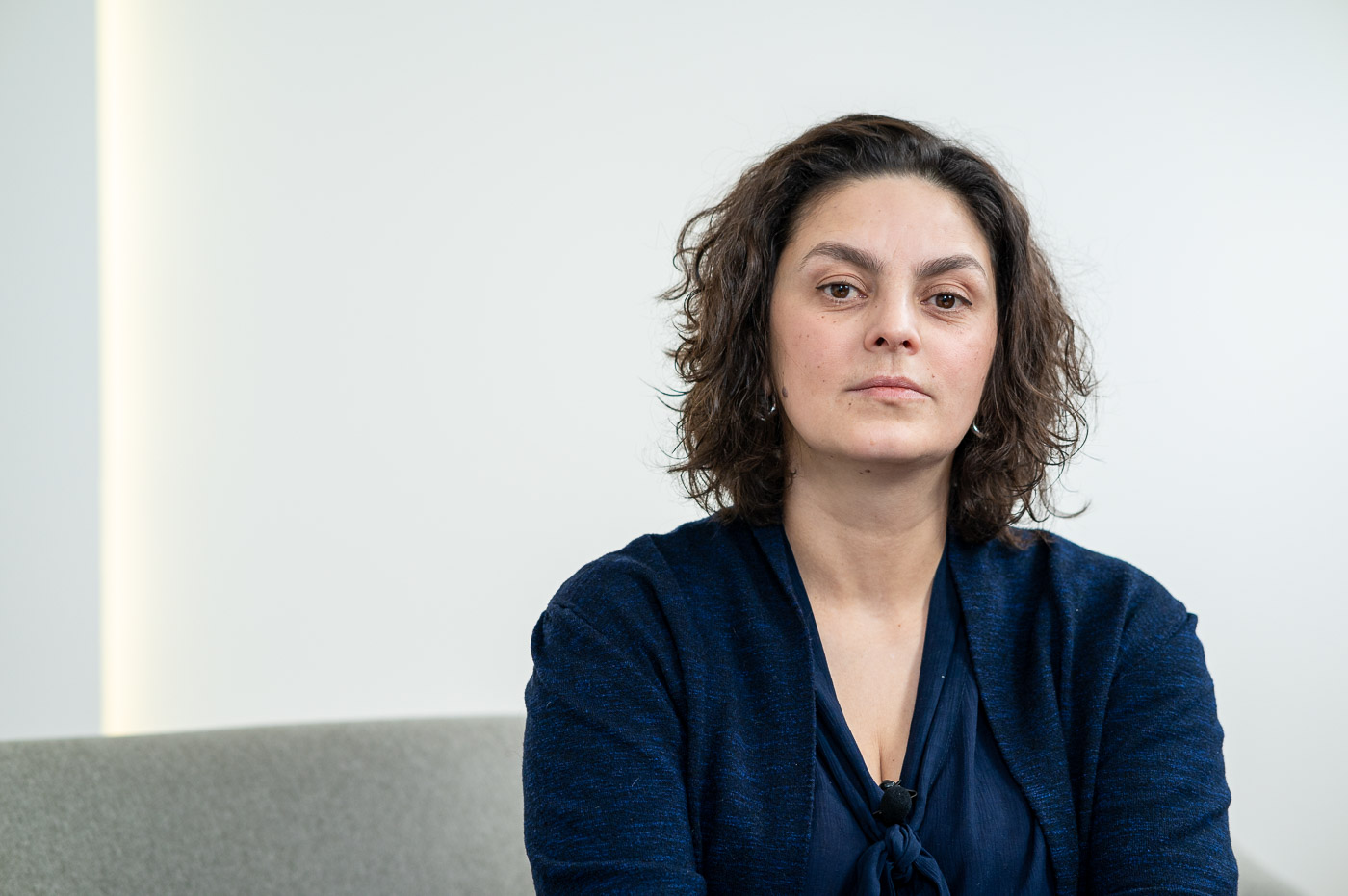
Let’s be honest, when you turned on the TV before the war or now you turn on M2 channel, where there is only Ukrainian music... Somewhere at a gas station or in a cafe, some kind of music is being played. I had a case during a month of the war there: we went somewhere to drink coffee, and suddenly, I heard Russian rap. I asked the waiter what was going on, and he said, «No, no, it’s Ukrainian rap.» That’s what I’m talking about: does a song in the Ukrainian language, created by Ukrainian citizens, always carry Ukrainian melos, or is that not enough?
Not always. It’s a process. Some turn out to be masterpieces, and some... There are a large number of created tracks, some of them «shoot», some are simply popular, correspond to the present, give the right «kick». Some are completely low-quality, and some will still be listened during 15 years from now. And this is normal, this happens in every country.
But if we take popular music, there can also be melos, for example, Arabic or Indian. They are popular in waves, people like them.
Balkan music was in the Balkans after the war. And now, I think, there will be a wave of trend for everything Ukrainian in the world. Here we get to the point. It seems to me that the Ukrainian listener is ready, since even the songs of «DakhaBrakha» are already soundtracks to many popular TV series and films: «Spiymaty Kaidasha» (To catch Kaidash), now also – «Cosa Nostra» with actress Irma Vitovska. Hearing these songs is already becoming the norm, just as the folk elements in «Shum» or «Stefania» are becoming the norm. It seems to me that the audience is ready to accept deeper, more serious Ukrainian folk music, a modern product created on the basis of even more archaic models. This should be done because you can skip this moment, and this wave will subside a little one way or another – these are the laws of life. Now this wave of Ukrainization, popularity of Ukrainian music, returning to the sources...
...interest in Ukrainian culture in the West...
...both in the world and among us. Now it is important not to fall into procrastination, despite the stress and the war, to create a maximum of ever cooler and wiser Ukrainian content. It supports and will feed this process. It is necessary to take already serious cantatas based on our operatic tradition, especially bring them to Europe, and continue to work in this direction.
If you take «Siyu-viyu» by Go-A and so on. We now have a lot of proposals based on some folklore, and sometimes you think that there are too many. Take Fry and Laurie. In their beautiful show, there was a character who appeared every time just to make fun of people who were into old Anglo-Saxon and British folklore. In general, I understand that here we are sitting and talking in the editorial office of the media called «Your City» [«Tvoe Misto» media hub, owner of Lviv Now]. And you, after all, are a representative of urban culture, which is why you are createing as part of it. One way or another, the future urban city creates civilization, including the Ukrainian one. How to find a balance here?
Now there is no need to look for any balance in Ukraine. We have not yet filled those cultural layers, they are still too thin, transparent. Academic music, choral music, and projects based on authentic ancient music still need to be added and completed. I have been digging folk music for many years and understand that, in fact, even for composers who write modern academic music and create jazz projects, this is an inexhaustible source. We will create our face before the world and for ourselves. Because you often hear: «Sing ‘Summertime’ also like this.» What will it do for you and the world? Or «perform a symphony, even a cool one…» If it does not have «juice» and certain vibrations, unlike anything else – well, it will be just another symphony. I am firmly convinced: whoever is smart now will dig and take from this inexhaustible source, and create the newest Ukrainian culture. There will be no excess, because this was not enough even during the years of independence. We are just getting to the point where a huge number of such projects will appear. Let there be an excess, as you say. God, I really want that there is a lot of this! And then, some more ingenious masterpieces can crystallize from this. And if there is no shaft, mass, or process -then it will be difficult, very rare.
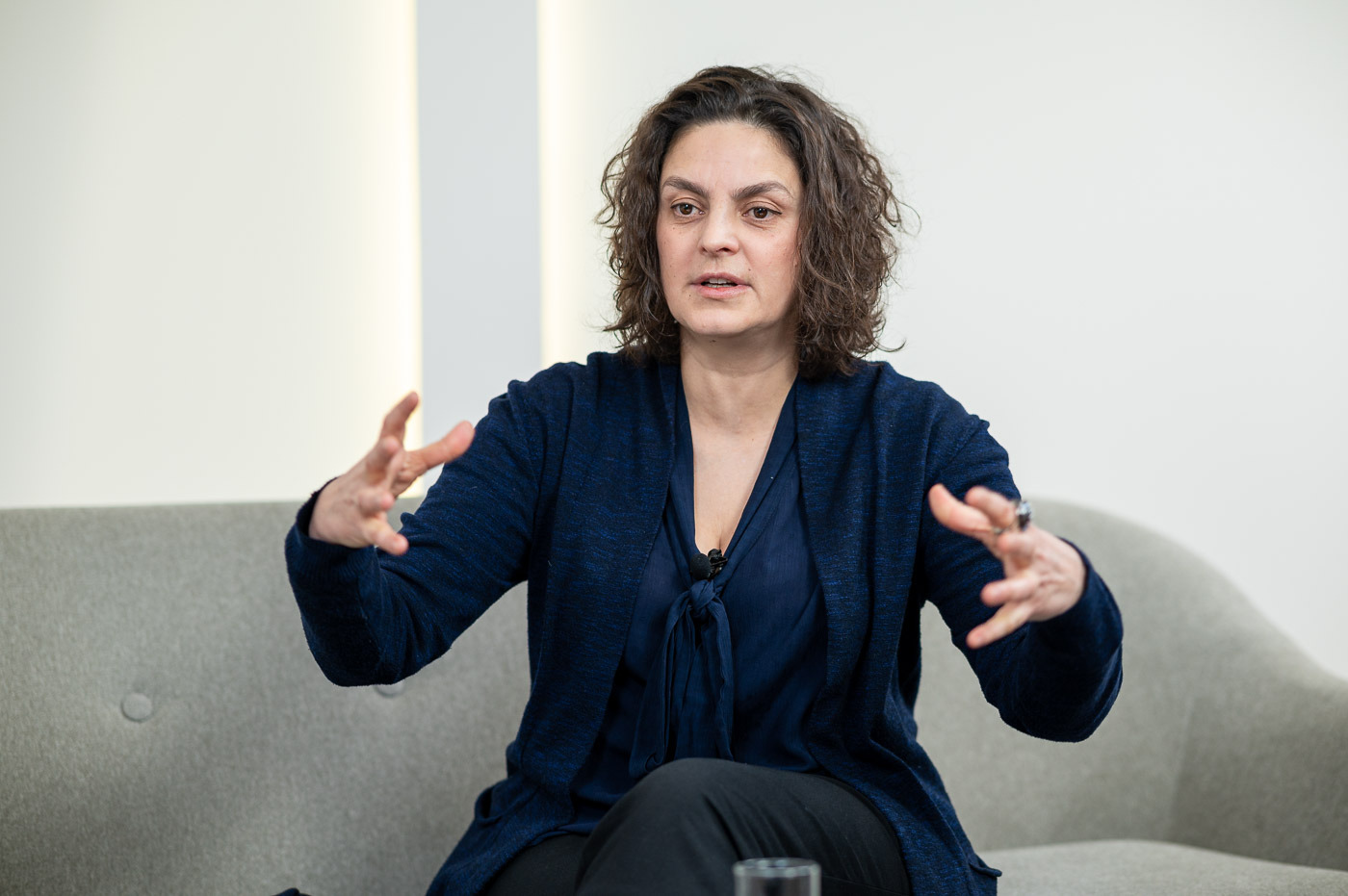
In Soviet times, Ukrainian culture was reduced to folklore, even the «bad folklore».
Definitely. There was a special change. It seems to me that the plastic crowns and collective farm women who sing in those compressed voices – it was done very cleverly. I think that more than one institution worked on it. They understood that banning a Ukrainian song was unrealistic. It is so powerful and woven into the Ukrainians that they sang in the wagons on the way to Siberia, and in Siberia, and in the villages.
Read also: Innovative museum tells stories of soviet-ordered deportation from western Ukraine to Siberia
What did they do? You won’t forbid people to sing in the house, will you? But you can get into their brains and change what a folk song is. For the grandmother, who was singing some ancient carol, replace it with «Oh, two oaks on the mountain» [a popular Ukrainian folk song]. And it must be such a wrong sound, and also some incomprehensible crooked wreath, and the garish, ugly embroidery. They did a lot of evil. Many people are surprised when they come to church and then say: «God, how cool a Ukrainian song can be! And we thought...» Of course, when ten voices shout at you and the sound is produced on the horizon, which «cuts off» the head of the listener, then one might say: «I don’t like folk.»
But you can also sing it cool. Listen to the people of Kuban’ singing it [meaning the ethnic Ukrainians living in Kuban’, the territory of the Russian Federation since 1991]. Their recording of the late 1980s will make you weep. Likewise, «The wind is blowing, the wind is rampant», which the Soviet pseudo-kobzars sang [kobzar was a travelling singer in Ukraine in the Cossack times, usually a blind man, who accompained himself with kobza, a traditional Ukrainian string instrument]. This is such «longing», these mustache-tears of Ukraine... And then you listen to the Kuban’ choir, a recording of the early 1990s. This track went to our opera-myth, to the finale. When I heard how the Kuban’ people sing... There is a will to live, dopamine in its purest form. There is vertical, there is a spiritual act, not singing. Even the usual «Tsvite teren« can be sung brilliantly, or it can be sung in a pop style, in that Soviet manner...
...or some Americanized style.
Yes, the way of singing is very important in my opinion. It is one thing to take a singing model, and quite another to sing with the right sound, have the right attitude and respect for the song. Do not squeeze it like a lemon. «Let’s do something interesting» – this is a common sin now. They take folk – and rock, jazz, something else. Sometimes they don’t dig enough, squeeze out and quickly take the tradition. But this process is impossible to bypass, let him go. For me, as someone who has been researching this song for many years and loves it, serious processes taking place now are very important, as well as ethnomusicologists who continue to bring the treasures to the surface. For example, the song in its unchanged form, which was recorded in the grandmother’s performing, the thing that «Bozhychi» and many other ensembles do. Projects that create new tracks from this tradition are just as important. I sin with this, but I do not interfere with the song itself. There can also be composer framings, but it would be cool if a person still immersed himself in the tradition, and did not run over the cream. Today, my entire speech can be summed up in one slogan – «Dig up the folk song!» Now there are many cool websites.
It is important for us to understand that in fact, every folk song without exception had an author, it’s just that those authors overlapped, and each added something different.
There is not one author here...
... not one, but still someone was at the beginning.
Yes, someone came up with an idea, a leitmotif, someone added it, and the next generation added a few more verses – and then polyphony was made. True, it is a long process, but maybe someone on the farm was born a Mozart, did not become that Mozart, but gave life to some super famous folk songs...
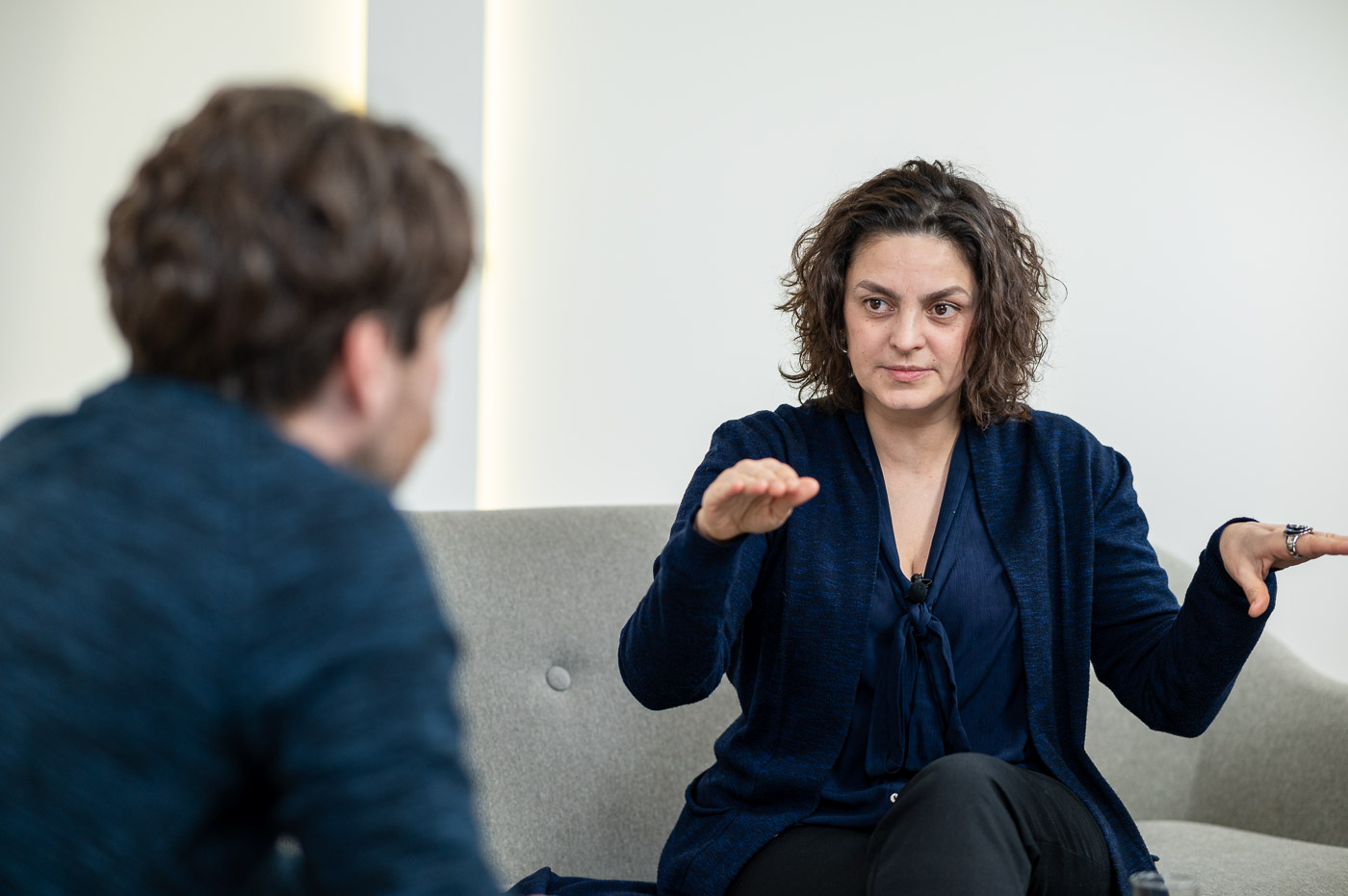
...who outlived him.
He gave the leitmotif, as well as the impetus, and then the long process of creating the final version. But there is no end to the living tradition. For many years, I went to Kryuchkivka, learned from my grandmothers, and trained how to sing. Hanna Popko was the oldest singer and said: «I came up with this verse.» There is a well-known polyphony «Snizhky« [snowflakes]. Anyone involved in folk music knows this song. She says: «I fell asleep in the evening and thought that it would be good if the nightingale appeared here.» That is, I saw a person who added one verse to a song that came to her from her great-grandmother.
Tradition is what you have to do now with songs. We must do the following, otherwise we will turn it into a museum, mummify it, pray, hold a memorial service with a folk song and say: «We used to have songs!» And if we stop there, the tradition will die. Tradition is when nativity scenes pass under your windows, when shchedrivry are taken, as I did with the «Zhaivir» choir and heard a rap there, without changing anything. The shchedrivky, set in a certain order, are absolute rap. Young people picked it up, nativity scenes are going, and it’s already a hit. There are a lot of such things laid out there, and if they are correctly presented to a modern young person, she will hear both archaic and modern side or modern melos in it. You have to work with the material.
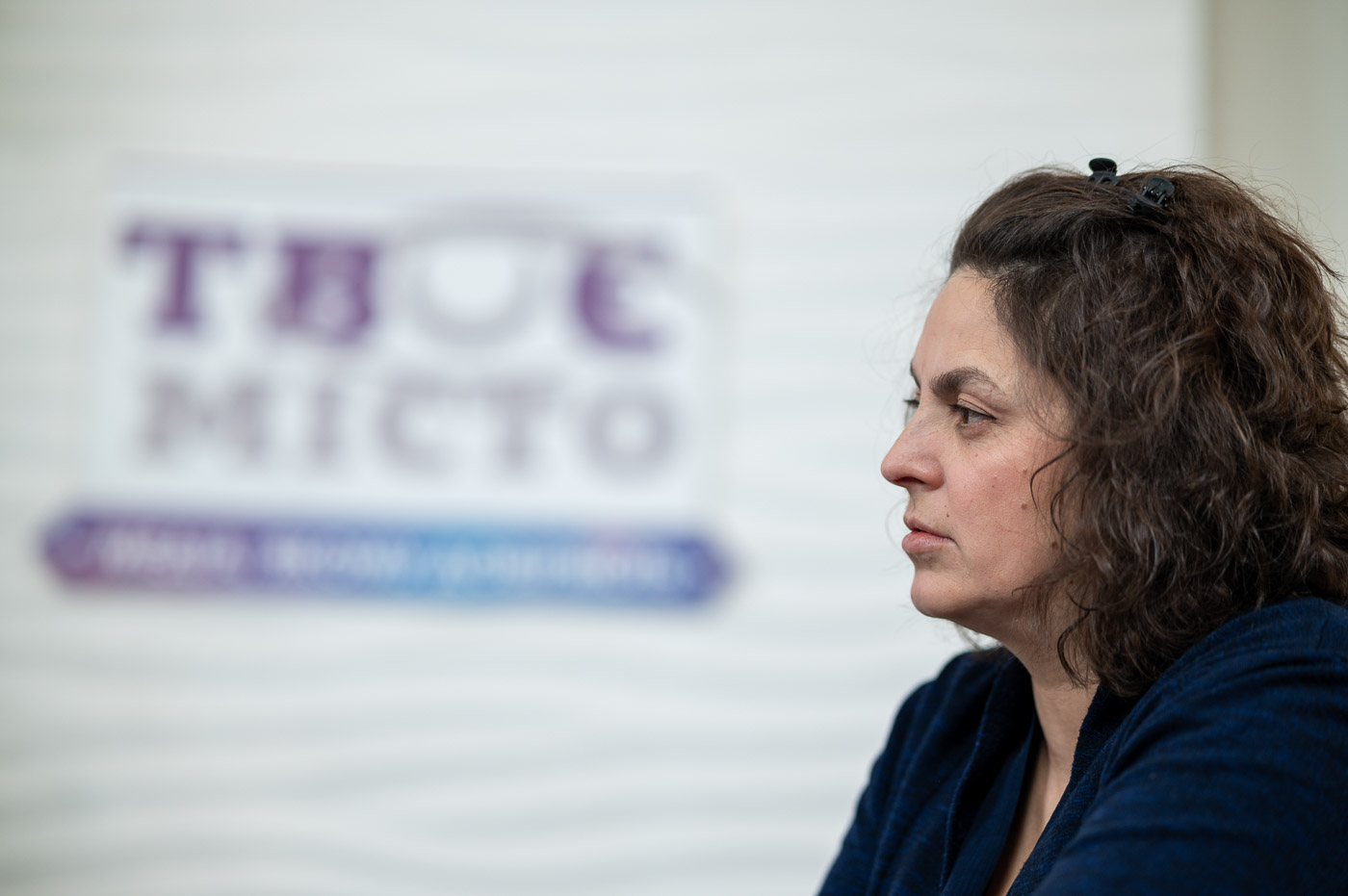
That’s true. I would like to believe that, maybe, starting next year, Ukraine will switch to the Gregorian calendar with all the conclusions and consequences. Accordingly, Malanka will fall on the New Year.
Yes, such a «coincidence».
And here it is interesting, which tradition will turn out to be strong, whether we will not lose it, and whether it can become part of the New Year’s celebration.
I think it would be cool. There is a Christmas tree, there are general European traditions of how to celebrate the New Year. In the distant 90s, I had an idea, and thank God, it has already been implemented many times. But I imagine if there was a nationwide Lightning Carnival on New Year’s Day. Imagine: a goat is walking 50 meters through the center of the city, performing a certain carnival dance, and a hundred Hutsuls are walking and singing. This is a carnival! All the tourists of the world would come to see this. Vasylko and Malanka are disguised, Grandma, Grandfather, a Gypsy – all these characters and modern moments.
That’s how everyone goes to the village in Zakarpattya and Bukovyna – two Malankas that are still celebrating. But if it is transferred to a high artistic level, done with a good director, involved funds... Imagine, every year on New Year’s Day – a Malanka calendar.
It would be great. And finally, concluding the conversation, let’s return to the Christmas carol. Ukrainian carol is both my personal experience and that of my wife. For example, we lived for a long time in the Kyiv region, in the long-suffering Bucha. And now it turned out that the Ukrainian carol, in fact, can be terribly attractive. My wife managed to organize a small group of children, most of whom are refugees after 2014 from the Luhansk and Donetsk regions. They were very interested, they got involved, wanted to sing carols, learned them, went and collected these carols, and performed nativity scenes. It’s something that easily beats out «money or candy» on Halloween. How are you doing with this tradition? The question is whether this carol should survive and spread throughout Ukraine?
It has to. And children are a very grateful soil for this. In fact, it is necessary to start working with children. They are like sponges, they are terribly sensitive. A child will listen to some pop in her headphones, you will teach her a cool Christmas carol – and the child will have pleasure. It seems that they will not want that here... But they will! Because they respond to honest, energetic and meaningful things, and they still have that right «antenna».
I had a Christmas project «Mosaika» (Mosaic). After 2014, the Zhadan Foundation and the «Artpole» agency came up with the idea of going to Stanytsia Luhanska, the Luhansk region, to play carols with children, and then bring them here and unite them with the Lviv carolers, with the «Zhaivir» choir. This concert is accessible even on YouTube, children from Stanytsia Luhanska came to Lviv and carolled. And when I arrived in Stanytsia Luhanska, their cultural center was half bombed. There were Russian-speaking children who, if they had heard any Ukrainian songs, had only heard them in music lessons. These were «polished», «plastic» songs. However, step by step, I gave them sound training, I gave them a cool carol... And do you know which one they liked the most? The carol from Zakarpattia! I also brought them their Eastern Ukrainian ones. «Mom, mommy, listen to what we’re singing!» – the girls turned on their mobile phones so that they could hear what they were singing. And there was «Among cedars, there the cradle made noise.» It was strange for them, because they understand the language, and melos is quite exotic...
What’s more, some of them started speaking Ukrainian already in Lviv – no one said a word to them, it happened naturally. One boy, already a teenager, hesitated where to join: the Donetsk Conservatory or the Lviv one. I told him: «Lviv.» He spoke Ukrainian, entered the Conservatory in Lviv, and then I met him on large projects. He played in the orchestra in the «Kovcheh» (Ark). One such trip to Stanytsia Luhanska «resetted» several people. I am not saying about all children, but I said: they should see that they have a big country behind them. They are at the outpost itself, behind them are Kyiv, Lviv – the rear is behind them. And I believe that for them, the Ukrainian-speaking environment was very correct and even world-viewing. And they still have such steppe ringing voices, they sang like a song from Donetsk that I returned to them. The people of Lviv did not just shout: «Bravo!» – the whole church «stood on its ears». There was also such a poignant moment: I send them to Stanytsia Luhanska, we stand with their teachers and hear from the crossings at the station «Shchedryk-shchedryk, shchedrivochka« (the beginning of «Carol of the bells» in Ukrainian) approaching. Believe it or not, a children’s choir that came to perform in Lviv, seems to be from Vinnytsia, is coming to our platform. Our children also know it, pick up, without saying anything, but simply join singing. Everyone gets on the platform, takes off, and children hug each other... It was a gift, it lasted seconds. And on the last «swallow», the sound of the train is heard, it approaches, the children get on to Vinnytsia, and 20 minutes later, the second one arrives – to the Luhansk region. And that’s it, the children left.

Such an unplanned flash mob.
Of course, but children will remember it for the rest of their lives. It is necessary to invest in them, give them a high-quality, not boring process, cool national models, to teach them. Some of them will become musicians, some will become composers and will know exactly where to dig, some will become directors, and some will simply teach their children these carols. Now is the war, I understand that it seems not the time, but it is necessary to invest in culture. I don’t know from what life, from what resources, but we should already prepare centers for young people, children from all over Ukraine, where they would not be bored to cultivate a love of tradition.
And what is your favorite carol from these more or less universally known ones?
Among the well-known ones that are sung all over Ukraine, this is «Heaven and Earth», I adore it.
Andrii Saichuk spoke
Text: Marichka Ilyina, translated by Vitalii Holich
Photo: Ivan Stanislavsky/ Tvoe Misto
Full or partial republication of the text without the written consent of the editors is prohibited and considered a violation of copyright.
Follow us on Facebook and Instagram. Lviv Now is an English-language website for Lviv, Ukraine’s «tech-friendly cultural hub.» It is produced by Tvoe Misto («Your City») media-hub, which also hosts regular problem-solving public forums to benefit the city and its people.












